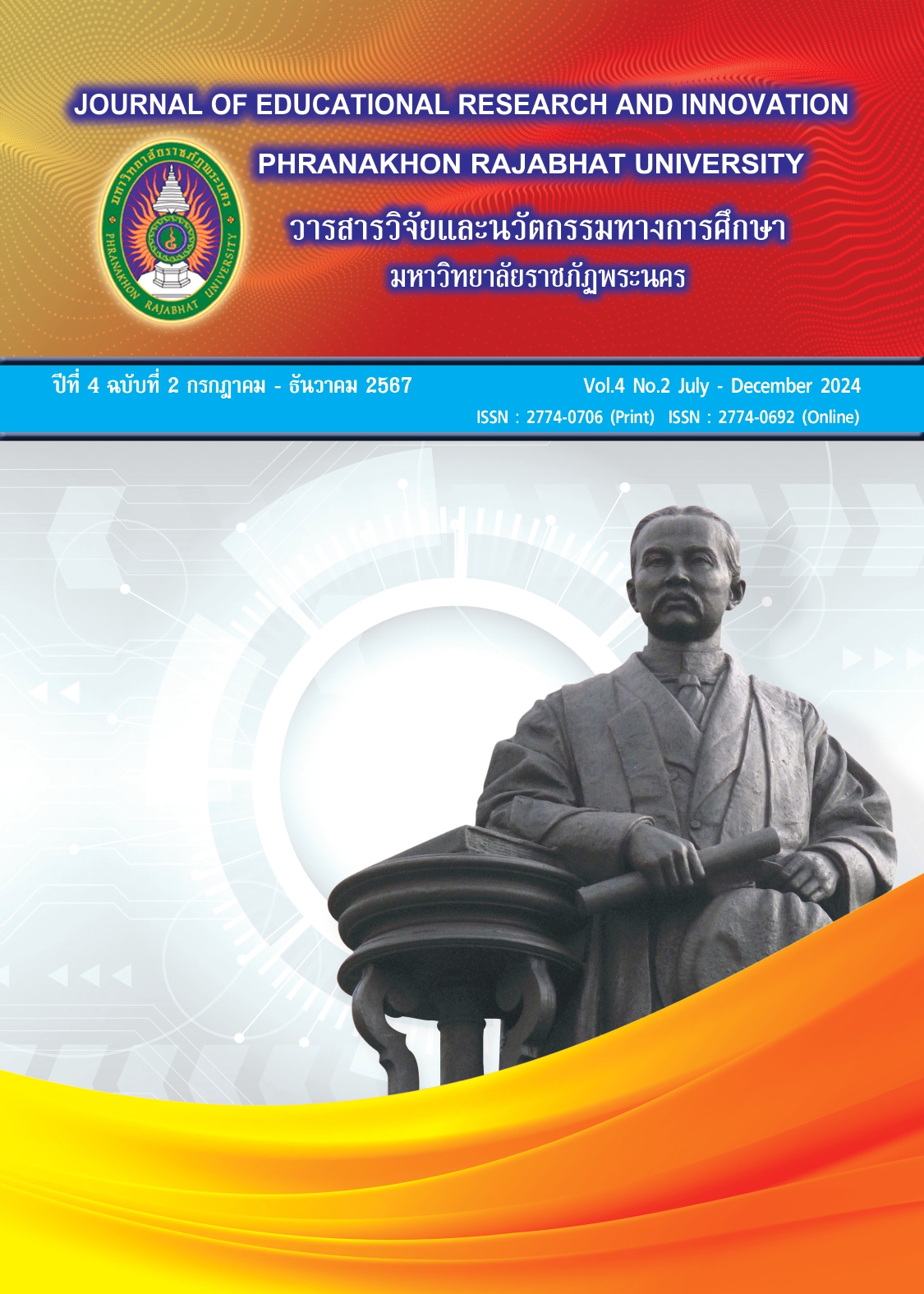การพัฒนารูปแบบการจัดการความขัดแย้งเชิงกลยุทธ์อย่างสร้างสรรค์ของมหาวิทยาลัยเทคโนโลยีราชมงคลในประเทศไทย
Main Article Content
บทคัดย่อ
การวิจัยครั้งนี้มีวัตถุประสงค์เพื่อ 1) ศึกษาองค์ประกอบของรูปแบบการจัดการความขัดแย้งเชิงกลยุทธ์อย่างสร้างสรรค์ของมหาวิทยาลัยเทคโนโลยีราชมงคลในประเทศไทย 2) ประเมินรูปแบบการจัดการความขัดแย้งเชิงกลยุทธ์อย่างสร้างสรรค์ของมหาวิทยาลัยเทคโนโลยีราชมงคลในประเทศไทย และ 3) นำเสนอรูปแบบการจัดการความขัดแย้งเชิงกลยุทธ์อย่างสร้างสรรค์ของมหาวิทยาลัยเทคโนโลยีราชมงคลในประเทศไทย โดยใช้ระเบียบวิธีวิจัยแบบผสานวิธี วิธีดำเนินการวิจัยมี 4 ขั้นตอน ได้แก่ 1) วิเคราะห์เอกสารและงานวิจัยที่เกี่ยวข้องกับการจัดการความขัดแย้งเชิงกลยุทธ์อย่างสร้างสรรค์ 2) การใช้เทคนิคเดลฟายกับกลุ่มผู้เชี่ยวชาญเพื่อหาองค์ประกอบด้านการจัดการความขัดแย้งเชิงกลยุทธ์อย่างสร้างสรรค์ จำนวน 25 คน 3) การสัมมนาอิงผู้เชี่ยวชาญ จำนวน 9 คน เพื่อทราบข้อคิดเห็นและข้อเสนอแนะเพิ่มเติม และ 4) ประเมินรูปแบบจากความคิดเห็นของผู้บริหารและบุคลากรทางการศึกษาของมหาวิทยาลัยเทคโนโลยีราชมงคล จำนวน 525 คน สถิติที่ใช้ในการวิเคราะห์ข้อมูล ได้แก่ ค่าร้อยละ ค่าเบี่ยงเบนมาตรฐาน ค่ามัธยฐาน และพิสัยระหว่างควอไทล์ ผลการวิจัยพบว่า รูปแบบการจัดการความขัดแย้งเชิงกลยุทธ์อย่างสร้างสรรค์ของมหาวิทยาลัยเทคโนโลยีราชมงคลในประเทศไทยมีความเหมาะสมโดยภาพรวมในระดับมาก โดยมีองค์ประกอบสำคัญ 7 ด้าน ได้แก่ 1) การยึดองค์กรเป็นศูนย์กลาง 2) การปรองดอง 3) การไกล่เกลี่ย 4) การยอมให้ 5) การหลีกเลี่ยง 6) การแข่งขัน และ 7) การร่วมมือร่วมใจ โดยมีตัวชี้วัด 41 ตัว และกลยุทธ์การจัดการความขัดแย้งประกอบด้วย 1) วิสัยทัศน์ 2) พันธกิจ 3) วัตถุประสงค์ และ 4) กลยุทธ์รอง 7 ด้าน ผลการวิจัยสามารถนำไปใช้ในการกำหนดเป็นนโยบายเชิงกลยุทธ์ของการบริหารจัดการมหาวิทยาลัยเทคโนโลยีราชมงคลในประเทศไทยเพื่อป้องกันและแก้ไขปัญหาความขัดแย้งในองค์กรทางการศึกษาอย่างสร้างสรรค์ รวมถึงการนำไปใช้เป็นเครื่องมือสำหรับผู้บริหารในการบริหารจัดการความขัดแย้งให้มีประสิทธิภาพต่อไป
Article Details
เอกสารอ้างอิง
Bradford, K.D., & Stringfellow, A.W. (2004). Managing Conflict to Improve the Effectiveness of Retail Networks. Journal of Retailing, 80(15), 181-195.
Canen, A.G., & Canen, A. (2008). Multicultural Leadership: The Costs of its Absence in Organizational Conflict Management. International Journal of Conflict Management, 19(1), 4-19.
Isabu, M.O. (2017). Cause and Management of School Related Conflict. African Educational Research Journal, 5(2), 148-151.
Jaisue, S., & Chatetiyoung, D. (2019). Conflict Management Model Based on New Concepts in Basic Education Institutions. Journal of Educational Research, Faculty of Education Srinakharindharawirot University, 14(1), 171-181.
Kiernan, L., Ledwith, A., & Lynch, R. (2020), Design Teams Management of Conflict in Reaching Consensus. International Journal of Conflict Management, 31(2), 263-285.
Lau, A.C.K. (2022). Mediation as an Alternative Dispute Resolution to Resolve Interpersonal Conflicts in Hong Kong Universities. Public Administration and Policy: An Asia-Pacific Journal, 25(3), 264-278.
Miall, H. Ramsbothan, O., & Woodhouse, T. (2011). Contemporary Conflict Resolution. Cambridge: Polity Press.
Pasamar, S., Johnston, K., & Tanwar, J. (2020). Anticipation of Work–Life Conflict in Higher Education. Employee Relations, 42(3), 777-797.
Pattanakulchai, W. (2011). Development of Conflict Management Strategies in Policies to Decentralize Education Management to Local Government Organizations. Doctor of Education in Educational Administration, Department of Management Policy and Educational Leadership. Chulalongkorn University.
Phakamach, P., Senarith, P., & Wachirawongpaisarn, S. (2022). ICT Systems Development Guidelines for Educational Innovation Management of Rajamangala University of Technology in Thailand. Journal of Education and Innovative Learning, 2(2), 109–130.
Phakamach, P., Wachirawongpaisarn, S., Phomdee, R., Vachungngern, P., & Rodniam, N. (2021). The Effective Organizational Strategy Factors of Success of Using the Digital Education Platforms in Higher Education Institutions in Northeastern Region. Proceedings of The 9th PSU Education Conference “A Better Change in Higher Education for Future Economy”, May 6-7, 2021. Thailand: Prince of Songkhla University.
Rukspollmuang, C. (2015). Situational Analysis of Education for International Understanding in Thailand. Comparative Sciences: Interdisciplinary Approaches (International Perspectives on Education and Society, Vol. 26), Emerald Group Publishing Limited, 215-242.
Sherif, Y. (2018). Middle Eastern Post-Conflict Futures in Education: Iraq, Syria and Yemen. International Journal of Comparative Education and Development, 20(3/4), 130-131.
Soomro, B.A., Saraih, U.N., & Ahmad, T.S.T. (2023). Personality Traits and Conflict Management Styles via Job Performance in Higher Education. Journal of Applied Research in Higher Education, 15(4), 1069-1094.
Stenner, K. (2005). Conflict Avoidance and Political Participation. Cambridge: Cambridge University Press.
Tuntivivat, S. (2016). The Inter-Relationship Between Violence and Education Amidst Armed Conflict in Southern Thailand. Journal of Aggression, Conflict and Peace Research, 8(4), 269-278.
Watson, N.T., Watson, K.L., & Stanley, C.A. (2017). Conflict Management and Dialogue in Higher Education. Information Age Publishing, Inc, Charlotte, NC.
Worapongpat, N., Phakamach, P., Panjarattanakorn, D., & Choothong, R. (2020). Creative Conflict Management Model in Higher Education Institutions. Journal of Graduate Studies, Walai Alongkorn Rajabhat University Under the Patronage of His Majesty the King, 14(2), 54-64.


